AMN conferences through the ages
13 April, 2023
When we celebrate an institute, we’re celebrating not only an organisation, but all that happens as a result of its existence. In the case of the MacDiarmid Institute, there are many impacts we can point to – the culture-shifts, the camps and scholarships for Māori and Pacific Island secondary and undergraduate students, our alumni pathways, affiliated spin-out companies and, more recently, the development of Mātauranga Māori within the Institute.
One of the most impactful outcomes of the Institute over the past 20 years has been our series of international conferences on advanced materials and nanotechnology (AMN), each of which attracts several hundred delegates from New Zealand and around the world and is the largest in its field in the Southern Hemisphere in the year it is run. The conferences have become a key feature of the materials science landscape in Aotearoa New Zealand.
These biennial in-person conferences have been attended by nine Nobel Prize laureates including Alan MacDiarmid, Alan Heeger, Hideki Shirakawa, Klaus von Klitzing, Stephen Chu, Sir Harry Kroto, Sir Anthony Leggett and Roald Hoffmann. The AMN conferences have offered high impact presentations at the forefront of their fields.
| No of attendees | NZ delegates | International delegates | No. of countries |
|---|---|---|---|
| AMN1 - Feb-03 - Wellington | |||
| 231 | 184 | 47 | 17 |
| AMN2 - Feb-05 - Queenstown | |||
| 413 | 182 | 231 | 30 |
| AMN3 - Feb-07 - Wellington | |||
| 450 | * | * | * |
| AMN4 - Feb-09 - Otago | |||
| 331 | 182 | 149 | 18 + |
| AMN5 - Feb-11 - Wellington | |||
| 392 | 210 | 182 | 30 |
| AMN6 - Feb-13 - Auckland | |||
| 454 | 250 | 204 | 27 |
| AMN7 - Feb-15 - Nelson | |||
| 524 | 227 | 297 | 34 |
| AMN8 - Feb-17 - Queenstown | |||
| 521 | 162 | 359 | 32 |
| AMN9 - Feb-19 - Wellington | |||
| 362 | 234 | 128 | 28 |
* No information available
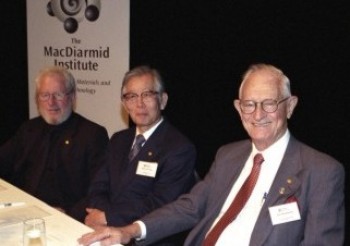
AMN1 (Left to right) Nobel laureates Professors Alan Heeger, Hideki Shirakawa & Alan MacDiarmid
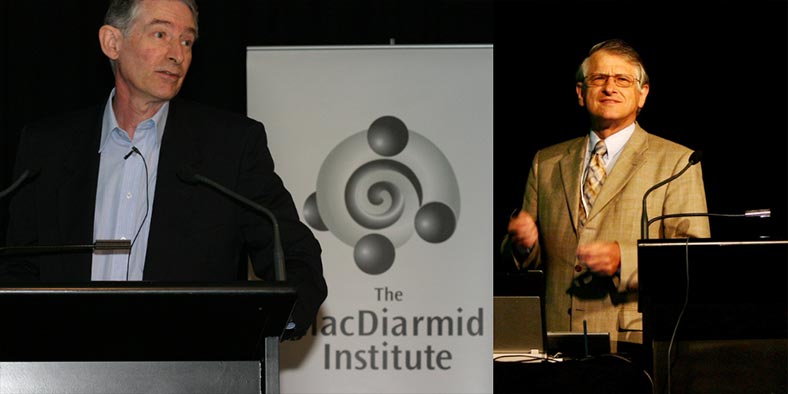
(Left to right) Professor Alan Kaiser with Nobel laureate Professor Klaus von Klitzing
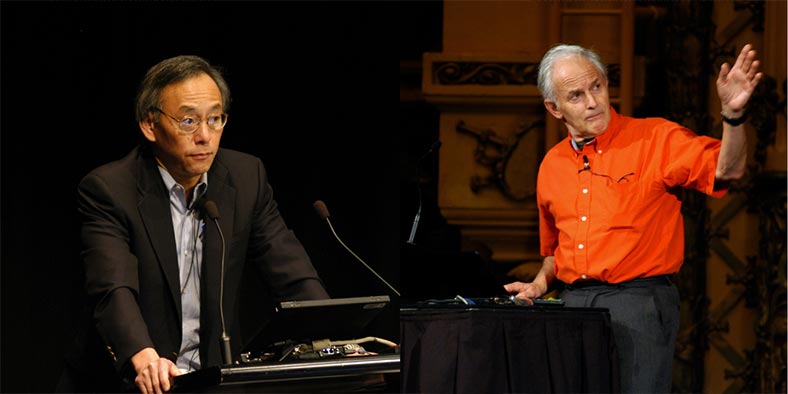
AMN3 (Left to right) Nobel laureates Professors Stephen Chu and Sir Harry Kroto
We asked a couple of our regular international attendees for reflections on the AMNs over the years.
MacDiarmid Institute International Science Advisory Board member and Karlsruhe Institute of Technology Professor Annie Powell has been to every AMN conference since her first AMN (AMN5) in Wellington in 2011. She says that as a molecular scientist, the inclusivity of the AMN conferences has been important and supportive.
“It’s awesome that I can be a molecular scientist and still contribute to the materials world. Molecules hold the key to so many things. Some of the most important "large" molecules support our life processes (for example haemoglobin). And when we say “large”, we’re actually talking about molecules which are small on a materials stage - mostly nanoscale or even smaller. I’ve enjoyed this about the conferences, and I’ve noticed the AMNs have become more inclusive over time.”
She also says the AMNs are particularly friendly. “Everyone is so welcoming and really appreciative that you’ve made the effort to travel.”
Fellow MacDiarmid Institute International Science Advisory Board member and University of Queensland Professor Matt Trau, who has attended three AMN conferences over the years, says that the conferences are consistently of high value.
"The AMN conferences reflect the Institute as a whole. The MacDiarmid Institute is a national treasure. The cross disciplinary, cross-country research programs are of global scale, innovation, and importance. There are so many examples of how high-quality MacDiarmid innovation is building and buttressing the high-tech industrial base in New Zealand. The Mātauranga Māori research programme is also immensely impressive."
The interdisciplinary nature of the Institute and the AMNs means that scientists from a wide range of backgrounds can join in and meet potential collaborators from related and disparate fields alike.
Professor Matt Trau MacDiarmid Institute International Science Advisory Board member University of Queensland
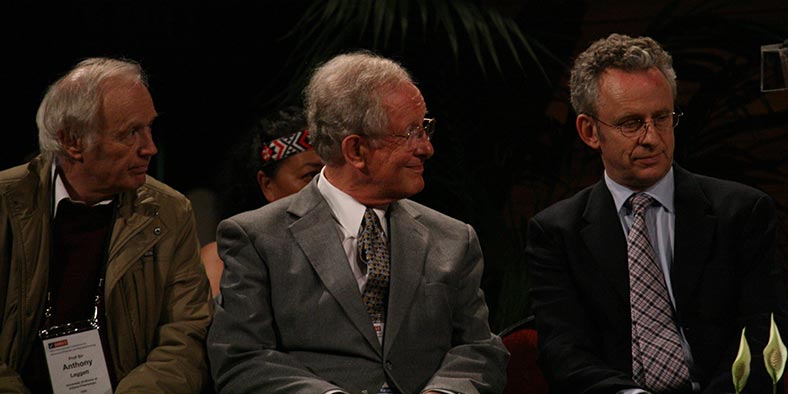
AMN5 (Left to right) Sir Anthony J Leggett with Professor Neil Ashcroft and Sir Richard H Friend
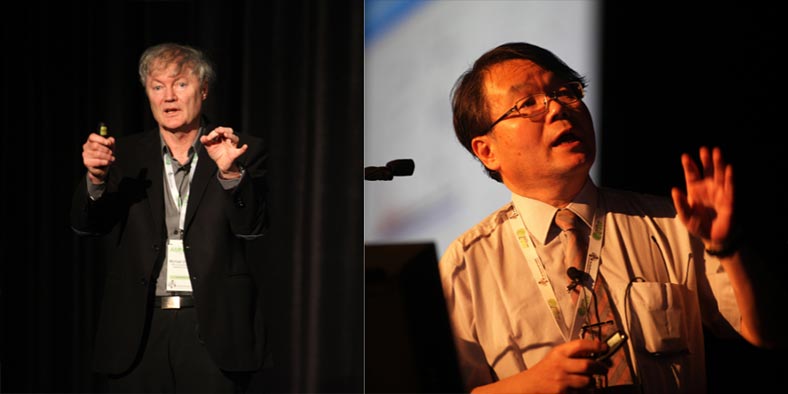
AMN7 Professors Michael Grätzel from EPFL (left) and Hideo Hosono from Tokyo Institute of Technology opening AMN7

AMN9 Professor Dan Nocera (left) speaking at AMN9 and (right) with NZ’s then Minister for Research, Science and Technology, Hon Dr Megan Woods
Further information on previous AMNs
- AMN1 speakers
- AMN2 speakers
- AMN3 speakers
- AMN4 speakers
- AMN5 speakers
- AMN6 speakers
- AMN7 speakers
- AMN8 speakers
- AMN9 speakers
- AMN10 annual report article


